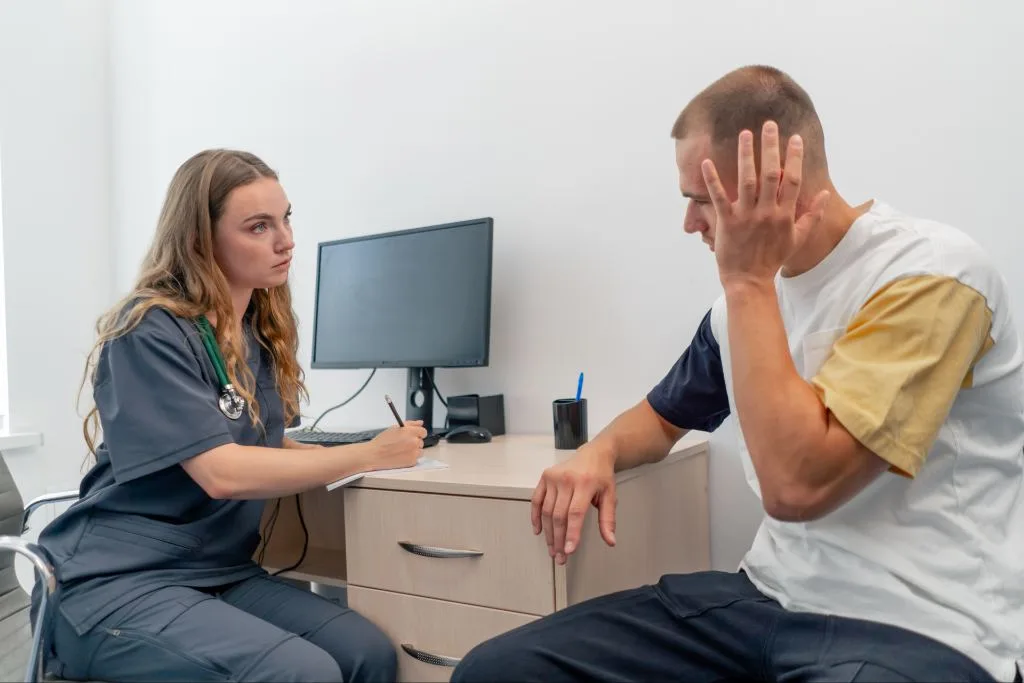It’s normal to feel sore after a car crash, but if you’re also getting migraines, your body might be reacting to more than just muscle pain. The force of the crash can affect your neck, back, and even your head, sometimes leading to migraines after the car accident. After an accident, getting checked by a car accident chiropractor can help you get more clarity on what’s causing your pain and help you start feeling better. Before you book a visit, here’s why your neck and back injuries from the crash might be triggering those migraines.
How Neck and Back Trauma Can Trigger Migraines After a Car Accident

A sudden impact from a crash can strain more than your back muscles. It can ripple through your spine and lead to intense head pain. Here’s how neck and back trauma often result in migraines after a car accident:
Whiplash
The violent jerk of your head and neck during impact stretches and strains muscles, ligaments, and joints. That tight, inflamed tissue often sends pain signals upward, leading to headaches that start at the base of your skull.
Muscle Tension, Spasms, and Inflammation
After a crash, your neck and shoulder muscles often tighten and spasm. As they stay inflamed, the pressure on nerves can trigger ongoing pain and pull on the skull’s nerves, causing migraine-like symptoms.
Pinched Nerves
Impacts can compress nerves in the upper cervical spine. That nerve irritation often produces sharp, shooting headaches, numbness, or tingling that mimic migraines.
Mild Concussion or Head Trauma
A minor brain injury or jarring blow, even without clear signs of concussion, can initiate a post-traumatic migraine. In these cases, both neck strain and mild brain jostling combine to trigger prolonged head pain.
Recognizing the Symptoms of Migraines After a Car Accident
Understanding your body’s signals is key to finding relief. Here’s what to watch for following a crash:
- Throbbing Pain on One Side, Nausea, Light or Sound Sensitivity: This is classic migraine. You may feel a pulsing ache on one side, along with nausea or sensitivity to light and noise. Visual disturbances like flashing lights can appear before the pain starts.
- Dull Pressure, Band‑Like Ache, Neck or Back Stiffness: This describes tension headaches. A steady, non‑throbbing soreness wraps around your head, often paired with neck and upper back muscle tightness.
- Pain Starting in Neck or Back and Radiating Upward: That’s a cervicogenic headache or neck-related headache. The pain begins in your neck or spine and travels up towards your head, often brought on by certain neck movements.
- Delayed Onset, Persistent Ache Days After Crash: Known as post‑traumatic headache. It may not appear immediately, but it shows up later and can persist without proper care.
What makes migraines linger after an accident? A combination of factors contributes to persistent migraine after a car accident. Ongoing inflammation and tight muscles keep putting pressure on nerves. Pinched or irritated nerves keep pain pathways stuck in “on” mode. On top of that, stress, poor sleep, or dehydration make migraines more frequent and intense. And when healing stops short or alignment remains off, those headaches become part of daily life, wearing you down.
Steps to Take If You Are Having Migraines After a Car Accident

Pressure from pain and uncertainty about next steps can feel overwhelming. Here are meaningful steps you can take if you are having persistent migraines after a car crash where your neck and back were injured:
1. Seek A Complete Medical Check-Up
Get evaluated by a doctor to rule out serious injuries like fractures or concussions. Imaging may be needed to ensure nothing deeper is causing your pain.
2. Request A Cervical And Spinal Assessment
Ask your provider to look closely at your neck and spine for signs of strain, compression, or alignment issues that could shine a light on why migraines are appearing.
3. Monitor And Record Your Headaches
Keep a headache log noting the timing, intensity, and any triggers. This insight helps your care team understand what’s fueling your migraines.
4. Notice Delayed Symptoms
Be alert for headaches that begin hours or days after the crash. These delayed-onset migraines still count and deserve attention.
5. Prioritize Rest, Hydration, And Routine
Give your body time to heal. Drink plenty of water, sleep on a consistent schedule, and avoid caffeine or screens before bed.
6. Watch For Warning Signs
If you experience a worsening headache, dizziness, confusion, vision changes, vomiting, or weakness, don’t wait. Seek immediate medical care.
Effective Treatment Options for Migraines After a Car Accident
There’s no single answer that works for everyone dealing with migraines after a car accident. Still, there are several options worth exploring based on your unique symptoms and medical advice.
Chiropractic Care
Spine adjustments and gentle mobilization help ease tension in the neck and back and support proper alignment, two factors often linked to migraines after car accidents. Gentle manual work can relieve muscle stress and pressure on nerves. Experienced chiropractors like Affordable Chiropractic Killeen use compassionate care and precision-focused methods to reduce pain and treat the root causes of migraine, contributing to lasting relief.
Physical Therapy
Physical therapy helps rebuild strength and flexibility in neck and back muscles while improving posture, which are key steps for preventing recurring strain. Tailored exercises also soothe irritated nerves that can trigger migraines after a car accident.
Prescribed Medications
Your doctor may recommend anti-inflammatories, muscle relaxants, or migraine-specific medications to help reduce inflammation and ease severe pain. These medicines can offer short-term relief, giving your body a better chance to heal and supporting other strategies to manage migraines after a car accident.
Interventional Treatments (Nerve Blocks)
Nerve blocks, such as occipital nerve injections, can quietly calm inflamed nerves that are firing off migraine pain signals. Patients often find relief within minutes to days, and the effects can last for weeks or months, making them an option when migraines after a car accident don’t respond to other approaches.
Self-Care Tips to Manage Migraines After a Car Accident
These simple habits can make a meaningful difference in how you feel each day following a crash. They’re easy to integrate, and they support your body’s own healing in gentle, effective ways:
- Support Your Neck and Posture: Adjust your seat and headrest to align your head properly. This simple change can help ease muscle tension and reduce strain on irritated nerves.
- Eat Anti‑Inflammatory Foods and Hydrate: Fruits, vegetables, omega‑3s, and whole grains help calm inflammation. Drinking enough water keeps muscles and nerves functioning well.
- Add Gentle Neck and Back Mobility to Your Day: Try slow neck rolls, chin tucks, and shoulder shrugs throughout the day. These movements encourage gentle flexibility without causing pain.
- Try Stretches and Heat/Cold Therapy: Apply warmth for about 15–20 minutes to loosen tight muscles, then use cold packs to ease swelling and dull, intense pain.
- Stick to Good Habits for Sleep and Stress: Go to bed and wake up at the same time each day. Try breathing exercises or meditation before bedtime. They help reduce migraine frequency and improve recovery.
Start Your Migraine Recovery After a Car Crash With Affordable Chiropractic Killeen
Pain in your neck or back after a car crash can show up in more ways than expected, and persistent headaches are one of the most frustrating. When migraines keep returning, it’s often a sign your spine and nerves are still under stress.
At Affordable Chiropractic Killeen, we help people recover from car accidents with care that’s focused, affordable, and built around your needs. From chiropractic adjustments to spinal decompression and soft tissue work, we’re here to relieve the pressure fueling your pain.
Let’s get you feeling better. Book an appointment online or contact us to learn how we can help with migraines after a car accident. You don’t have to keep living in pain.

